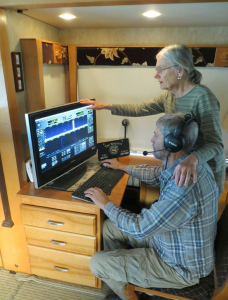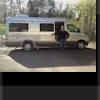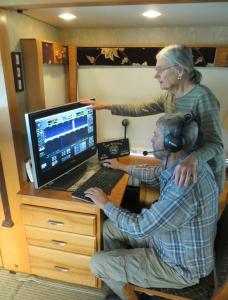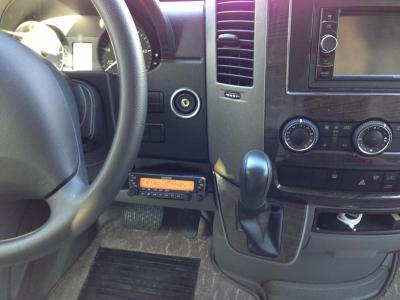Amateur Radio and the RVer
 Thanks to the Internet and email, text messaging and Facebook updates, it’s easy to stay in touch with friends and family while traveling.
Thanks to the Internet and email, text messaging and Facebook updates, it’s easy to stay in touch with friends and family while traveling.
But a very active group of RVers takes such connectivity to a whole new level, out-Interneting even the Internet when it comes to being able to communicate with the world.
They take their own radio stations with them.
They are members of the Amateur Radio Chapter of the Family Motorcoach Association and their radio stations are ham radio transceivers that let them communicate with other ham operators from their motorhomes and, during the off season, from their sticks and bricks homes.
Amateur radio is not the same thing as CB, or Citizen’s Band radio. CB radio is short-range, low-powered communications and mostly used by truckers and highway drivers these days. It’s noisy, undisciplined and often plagued by interference and rude or profane language.
Amateur radio is just the opposite, a popular hobby and service in which licensed “ham operators” operate communications equipment using a variety of forms, from voice to Morse Code to digital. To become a radio amateur, operators must demonstrate basic knowledge of radio technology and operating principles and pass an examination to get a Federal Communications Commissions (FCC) license to operate on radio frequencies known as the “Amateur Bands.” These bands are radio frequencies reserved by the FCC for use by ham radio operators.
Ham frequencies can connect amateurs from across the street to across the world.
Besides just talking and visiting with their on-the-air friends, many radio amateurs donate their time and equipment for public service work during times of emergency or disaster.
I’ve been a ham operator since 1962 when, as a teenager, I became K8ZRH, my ham radio call. Over the years, I’ve been in and out of the hobby. For a while, I was obsessed with “chasing DX,” or making contact with different ham operators all over the world. I earned certificates for working amateurs in all 50 states, then from over 100 counties.
I learned and mastered Morse Code, the language of transmitted dots and dashes. I built all sorts of different antennas, bouncing signals of satellites, even the moon.
I embraced computer technology, joining my ham radio transceiver to my computer and using digital communications.
I got involved in contesting, or radio sport as its sometimes known. There are ham radio contests almost every weekend in which hams try to make contact with operators under all sorts of conditions, such as using emergency battery or solar power and trying to accumulate as many contacts as possible in a specific period of time.
The contests are training exercises, really. First and foremost, amateur radio is a service. If normal communications should ever fail, ham radio operators are practiced and ready to donate their time and expertise to keep the nation in touch.
That’s the great thing about ham radio, there are so many fascinating activities and services you can tap into.
Lately, it’s that public service aspect that has taken up most of my ham radio time. The first accessory I added to my motorhome when I started my RVing adventures was a ham radio transceiver. I’m part of my local community’s Amateur Radio Public Service Corps, which works with the Department of Homeland Security, to provide emergency communications when needed.
I’ve taken special classes from meteorologists to be a severe weather spotter, something hams do when bad weather threatens to provide trained observers during weather warnings.
And I’ve embraced ham “Nets,” short for Networks, or groups of stations that gather on a specific frequency at a set time to exchange communications. That’s how I discovered the FMCA Amateur Radio Chapter.
The group runs communications Nets Monday, Wednesday and Fridays, gathering at 1 PM Eastern Time from all across the country. A Net Control volunteer coordinates check-ins and directs one station to talk at a time. Conversation typically revolves around the main interests of the members, motorhome travel and amateur radio. It’s like an RV rally on-the-air.
Members chat about modifications they’ve done to their motorhomes, their radios, antenna systems and, of course, the weather.
The chapter also has a website at http://fmcaarc.com that pinpoints the mobile or fixed locations of many of its 86 members on a map.
And just like other FMCA chapters, they attend FMCA rallies and campouts throughout the year.
Les Wright, is the chapter president, known to his fellow hams by his call sign AA7YC. He and wife, Carole, have been fulltimers since 2002, traveling the country in a 36-foot 2009 Alpine Coach. They are Nevada residents with longtime friends and family in the Reno area and usually spend a few weeks there each year. But with kids and grandkids in New York, North Carolina, Nevada, and California, they are on the road more often than not.
Les has been a huge evangelist for both motorhoming and amateur radio.
“The two go together hand in hand,” he said. “We get to stay in touch all the time and stay connected with what people are seeing, where they are going, instead of once or twice a year when we meet at rallies.”
Les and Carole are both licensed and both participate in the radio contacts throughout the week. Their “radio shack,” as hams call their equipment room, connects through a computer in his motorhome with a transmitter stowed in the storage “basement.” He travels with several antennas, including one that mounts atop a telescoping flagpole attached to the back of the coach.
“For us, being fulltimers, amateur radio has been a great way to have community wherever we go,” says Carole.
For Karla and Larry Dayhuff (FMCA #) from Lecanto, FL , meeting the Wrights was infectious. Larry, had been a ham radio operator years before but was inactive. After being exposed to the FMCA Amateur Radio Chapter, he once again plunged into the hobby full tilt, even going so far as to study and pass the stringent exam for the most advanced ham license there is, Amateur Extra Class, N7LWD. Larry is now chapter Vice President.
Wife Karla studied and obtained the General Class license, K4KLD, which allows her to operate on all ham bands. She’s the chapter Secretary and Membership Chair.
They travel extensively in a 2006 Monaco Windsor and use amateur radio on the road from their motorhome and their Florida home.
“We love the community we’ve met through RVing and ham radio,” she says. “We have met so many new friends.”
Community. That’s a word you hear a lot from ham operators.
Amateur radio is a very social pastime. While many are attracted by an initial interest in the technology and electronics that make two-way radio communication possible, most amateurs just enjoy “ragchewing,” or casual conversation with friends – friends who may just happen to on the other side of the continent, or world.
And when you add in RVing and motorhome travel, there’s no shortage of fun things to talk about.
Till next time, as the ham operators say ...73.
(73 is the ham radio term for “Best Regards.”)
FMCA membes Les and Carol Wright at the controls of their ham radio station in their 2009 Alpine Coach motorhome.
This is my VHF/UHF ham rig mounted in my Roadtrek eTrek.





1 Comment
Recommended Comments
Please sign in to comment
You will be able to leave a comment after signing in
Sign In Now